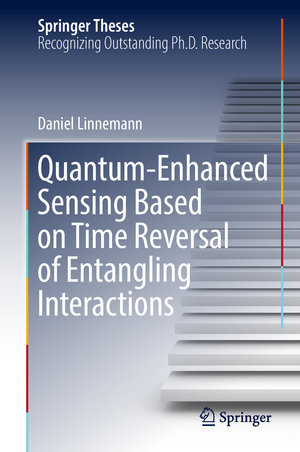Quantum‐Enhanced Sensing Based on Time Reversal of Entangling Interactions: Springer Theses
Autor Daniel Linnemannen Limba Engleză Hardback – 9 aug 2018
| Toate formatele și edițiile | Preț | Express |
|---|---|---|
| Paperback (1) | 635.01 lei 6-8 săpt. | |
| Springer International Publishing – 28 dec 2018 | 635.01 lei 6-8 săpt. | |
| Hardback (1) | 641.03 lei 6-8 săpt. | |
| Springer International Publishing – 9 aug 2018 | 641.03 lei 6-8 săpt. |
Din seria Springer Theses
- 18%
 Preț: 997.88 lei
Preț: 997.88 lei -
 Preț: 389.88 lei
Preț: 389.88 lei - 15%
 Preț: 646.94 lei
Preț: 646.94 lei - 18%
 Preț: 943.43 lei
Preț: 943.43 lei -
 Preț: 399.29 lei
Preț: 399.29 lei - 18%
 Preț: 944.99 lei
Preț: 944.99 lei - 15%
 Preț: 636.80 lei
Preț: 636.80 lei - 18%
 Preț: 941.05 lei
Preț: 941.05 lei - 15%
 Preț: 643.16 lei
Preț: 643.16 lei - 15%
 Preț: 642.68 lei
Preț: 642.68 lei - 18%
 Preț: 1103.62 lei
Preț: 1103.62 lei - 20%
 Preț: 558.83 lei
Preț: 558.83 lei - 18%
 Preț: 1112.30 lei
Preț: 1112.30 lei - 18%
 Preț: 944.19 lei
Preț: 944.19 lei - 18%
 Preț: 1109.92 lei
Preț: 1109.92 lei - 18%
 Preț: 1217.27 lei
Preț: 1217.27 lei - 15%
 Preț: 640.06 lei
Preț: 640.06 lei - 15%
 Preț: 636.45 lei
Preț: 636.45 lei - 15%
 Preț: 640.06 lei
Preț: 640.06 lei - 15%
 Preț: 640.88 lei
Preț: 640.88 lei -
 Preț: 389.70 lei
Preț: 389.70 lei - 20%
 Preț: 563.91 lei
Preț: 563.91 lei -
 Preț: 393.35 lei
Preț: 393.35 lei - 15%
 Preț: 637.93 lei
Preț: 637.93 lei - 15%
 Preț: 641.85 lei
Preț: 641.85 lei - 18%
 Preț: 1225.94 lei
Preț: 1225.94 lei - 20%
 Preț: 551.36 lei
Preț: 551.36 lei - 18%
 Preț: 1229.10 lei
Preț: 1229.10 lei - 15%
 Preț: 639.25 lei
Preț: 639.25 lei - 18%
 Preț: 999.45 lei
Preț: 999.45 lei - 15%
 Preț: 640.06 lei
Preț: 640.06 lei - 18%
 Preț: 1220.45 lei
Preț: 1220.45 lei - 18%
 Preț: 1116.26 lei
Preț: 1116.26 lei - 18%
 Preț: 1110.72 lei
Preț: 1110.72 lei - 18%
 Preț: 1000.87 lei
Preț: 1000.87 lei - 18%
 Preț: 891.17 lei
Preț: 891.17 lei - 15%
 Preț: 640.06 lei
Preț: 640.06 lei - 5%
 Preț: 1154.07 lei
Preț: 1154.07 lei - 15%
 Preț: 635.96 lei
Preț: 635.96 lei - 15%
 Preț: 640.88 lei
Preț: 640.88 lei -
 Preț: 387.20 lei
Preț: 387.20 lei - 18%
 Preț: 1109.92 lei
Preț: 1109.92 lei -
 Preț: 385.25 lei
Preț: 385.25 lei -
 Preț: 385.25 lei
Preț: 385.25 lei - 18%
 Preț: 1112.30 lei
Preț: 1112.30 lei - 18%
 Preț: 999.45 lei
Preț: 999.45 lei -
 Preț: 386.99 lei
Preț: 386.99 lei - 15%
 Preț: 637.13 lei
Preț: 637.13 lei - 20%
 Preț: 554.21 lei
Preț: 554.21 lei - 20%
 Preț: 555.59 lei
Preț: 555.59 lei
Preț: 641.03 lei
Preț vechi: 754.15 lei
-15% Nou
Puncte Express: 962
Preț estimativ în valută:
122.67€ • 131.17$ • 102.27£
122.67€ • 131.17$ • 102.27£
Carte tipărită la comandă
Livrare economică 17 aprilie-01 mai
Preluare comenzi: 021 569.72.76
Specificații
ISBN-13: 9783319960074
ISBN-10: 3319960075
Pagini: 146
Ilustrații: XVIII, 165 p. 64 illus., 63 illus. in color.
Dimensiuni: 155 x 235 mm
Greutate: 0.44 kg
Ediția:1st ed. 2018
Editura: Springer International Publishing
Colecția Springer
Seria Springer Theses
Locul publicării:Cham, Switzerland
ISBN-10: 3319960075
Pagini: 146
Ilustrații: XVIII, 165 p. 64 illus., 63 illus. in color.
Dimensiuni: 155 x 235 mm
Greutate: 0.44 kg
Ediția:1st ed. 2018
Editura: Springer International Publishing
Colecția Springer
Seria Springer Theses
Locul publicării:Cham, Switzerland
Cuprins
Introduction.- Part I: Theoretical Basics.- Quantum Mechanical Spin.- Hamiltonian of a Spin-1 Bose-Einstein Condensate.- Part II: Concepts of Time Reversal Interferometry.- Spin Exchange as an Amplifier.- Interferometry Concept Within the SU(1,1) Framework.- Part III: Experimental Platform.- Experimental System and Manipulation Techniques.- Part IV: Experimental Results.- State and Process Characterization.- Quantum-Enhanced Sensing Based on Time Reversal.- Interferometry Beyond Exact Time Reversal.- Nonlinear Time Reversal as a Diagnostic Tool.- Outlook.
Textul de pe ultima copertă
Quantum mechanics entails effects like superpositions and entanglement, which have no classical counterparts. From a technological standpoint these counterintuitive quantum aspects can be viewed as an unexploited resource that can be harnessed to support various tasks, e.g. in the domains of computation, communication, and metrology.In many applications, however, the potential of nonclassical states cannot practically be exploited due to detection inefficiencies. The authors address this limitation by experimentally realizing a novel detection scheme in which entangling interactions are time reversed. In this way, nonclassical many-particle states are disentangled, allowing them to be detected in a robust and technically feasible manner. In the context of quantum metrology, these nonlinear readout techniques extend the class of entangled probe states that can be leveraged for sensing applications without being limited by finite detector resolution.
The authors present an active atom interferometer, where both the entangled state preparation and disentangling readout involve parametric amplification. This “SU(1,1)” interferometer is implemented with the help of spinor Bose–Einstein condensates, where amplification is implemented by atomic collisions leading to spin exchange.
Caracteristici
Nominated as an outstanding Ph.D thesis by the University of Heidelberg, Heidelberg, Germany Makes an important contribution to applied quantum technologies Backs key results with intuitive arguments and instructive examples from classical mechanics and quantum optics
